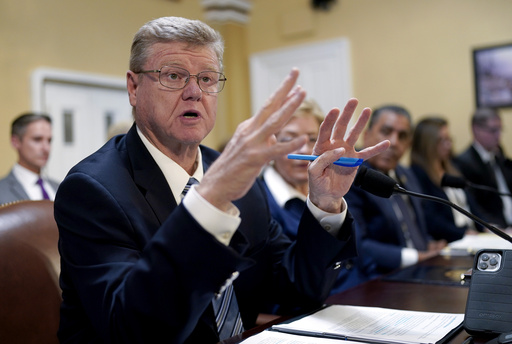WASHINGTON — Six lawmakers have offered insights into their experiences in the U.S. House of Representatives, describing the environment as polarizing, challenging, and often frustrating. They express concerns about the current state of governance, life-threatening incidents, and the essence of representation in a fractured democracy. Despite these challenges, they continue their political careers, seeking reelection for another term.
The lawmakers, including three Republicans and three Democrats, collectively reflect on their motivations for entering politics and their persistence in returning to Capitol Hill. Each represents a safe district where they anticipate easy victories in the upcoming elections.
Among the Republicans, Dusty Johnson represents the entirety of South Dakota and entered politics in 2018, believing he could provide a more constructive presence in Congress. Nicole Malliotakis, whose heritage combines Cuban and Greek roots, sought to serve as a voice for Republicans in New York City, representing areas like Brooklyn and Staten Island since 2020. Mark Amodei, in office since 2011, emphasizes his duty to contribute to the state that his family has called home for generations.
On the Democratic side, Chrissy Houlahan, an Air Force veteran, was motivated to run for office in 2018 to advocate for her community and to support her daughter in a challenging political climate post the 2016 election. Veronica Escobar, representing El Paso, Texas, strives to counter negative perceptions about immigrants and to uplift local narratives. Maxwell Frost, the youngest Congress member, initially hesitated to run but decided to channel his activism into official duties after the Parkland school shooting, winning a seat in 2022.
However, these politicians do not shy away from conveying their frustrations. Frost describes the operational chaos in Congress, noting the extensive inefficiency, while Malliotakis acknowledges the ups and downs of life on Capitol Hill. All six legislators have experienced significant political events, including multiple presidential impeachments, internal conflicts over House leadership, and the impact of the pandemic and the Capitol riots.
Houlahan articulates that unexpected events have become commonplace. She expresses exasperation at the lack of progress, stating that representatives should be proactive rather than stagnant. Amodei believes that cooperation is essential for productivity in Congress, while Escobar admits the job is challenging yet fulfilling.
When discussing potential improvements, Houlahan highlights structural disorganization within the House, with representatives operating more like individuals than a cohesive unit. Johnson argues the problem lies with electoral choices and the need for accountability among elected officials. Frost calls attention to the necessity for reform in campaign finance and legislative processes to break the cyclical nature of political stagnation.
They also consider ways for Americans to assist in improving Congress. Escobar points out that the political climate mirrors societal divisions, contributing to family discord over political disagreements. Malliotakis suggests that voter awareness regarding their representatives’ actions is crucial, stressing the importance of informed electoral choices.
Regarding safety, Malliotakis reveals that threats have become a part of the job for many lawmakers. Escobar has curtailed large public gatherings due to fears of violence, reflecting on the potential risks posed to constituents. Houlahan acknowledges the inherent dangers in their roles, urging leaders to condemn rather than facilitate political aggression. Frost connects these threats to the current hostile political rhetoric.
Despite the negatives, all six lawmakers celebrate the small successes that bring meaningful change. Frost recounts the pride he felt in advocating for the establishment of the Office of Gun Violence Prevention, while Amodei recalls his efforts to memorialize Vietnam War veterans at Arlington National Cemetery. Johnson believes that the most rewarding moments arise when substantive votes occur, reinforcing the importance of their legislative actions.
Their reasons for continued service are rooted in the belief that their work matters. Johnson emphasizes the significance of the role they play, while Malliotakis finds fulfillment in serving her constituents effectively. Houlahan is hopeful for a future where Congress can function more cohesively, and Frost warns against stepping back from civic engagement, stating that the responsibilities of Congress should align with public need.
In contemplating the relevance of Congress, Johnson contends that dismissing its importance is a sign of naive citizenship. Amodei challenges cynics to consider the practical implications of Congress’ work, particularly in areas affecting senior citizens and border security. Escobar reinforces that every action taken within Congress has a direct impact on citizens’ lives, underscoring the institution’s critical role in governance.



